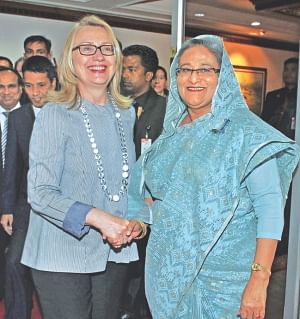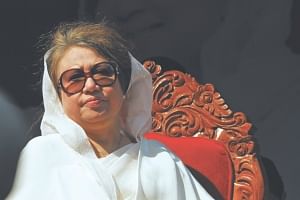| Home - Back Issues - The Team - Contact Us |
 |
| Volume 11 |Issue 19 | May 11, 2012 | |
|
|
Current Affairs Talks in Turbulent Times Politics is going to be back to its usual self Shakhawat Liton The BNP-led opposition alliance did not enforce any hartal after the back-to-back shutdown in the last two days of April. It was learnt that they refrained from enforcing hartal for the last one week due mainly to the visits of US Secretary of State Hillary Clinton, Indian Finance Minister Pranab Mukherjee and Japanese Deputy Prime Minister (DPM) Katsuya Okada. The string of high profile visits began from May 3 with the Japanese DPM. He left Dhaka for Colombo the next day. On May 5, the following day, Hillary and Pranab arrived in the capital. They left Dhaka separately for India on Sunday.
It was also almost certain that the BNP would enforce hartal on May 9 and 10 and that they would declare it on Sunday afternoon. But the opposition did not do so. A senior BNP leader says that they refrained from declaring a shutdown on May 9 and 10 "in Hillary's honour" as she has urged them not to go for violent agitation. The opposition leader says the onus now lies on the government to improve the political atmosphere, so that the opposition parties do not have to call hartal. However, on Sunday, the BNP-led 18-party alliance declared countrywide demonstration programmes for Wednesday to press home its demands which included the return of its missing leader M Ilias Ali. "We hope that the government would meet our demands within this time (May 9). Or else we will announce tougher programmes on that day," BNP leader Moudud Ahmed told a press conference. The opposition leader's warning suggests that more hartals are in the offing. It also means people will have to endure unrest in the street while ruling and the opposition parties will be shedding crocodile tears for the masses. However, people should be thankful to Hillary, Pranab and Okada for their visit to Bangladesh. They should express their gratitude to the foreign dignitaries because of their kind presence in Dhaka, which gave the ordinary people some respite from the bickering of their political leaders–the opposition parties did not call hartals, and the government did not intensify its crackdown on the opposition leaders. In a time where politics is increasing becoming acrimonious, the people have heard, from the visiting guests, words of friendship and good governance. Of the good words, US Secretary of State Hillary's ones were considered very important. Hillary urged all political actors in Bangladesh to settle their differences through dialogue and plan for holding the next general election in a free, fair and credible manner. She also said that it was the responsibility of the political parties to find out how a free, fair and participatory election could be held in Bangladesh. Indian Finance Minister Pranab also stressed the need for talks among the parties to find a solution to the ongoing political crisis. Hillary and Pranab's plea has brought to the fore the issue of holding talks. Will our politicians now pay heed to the foreign guests' words? People, regardless of their political affiliation, have been expecting that the ruling and opposition parties will hold a dialogue to resolve the present political impasse. Senior leaders of both the ruling AL-led alliance and BNP-led opposition have also been stressing the need for holding talks to overcome the growing crisis. The nullification of the caretaker government system by the government in last June have cast an uncertainty over holding the next parliamentary polls, which would be participated by all major political parties. BNP-led opposition parties have outright rejected the constitutional amendment that scrapped the caretaker government system and declared that they would boycott the next parliamentary polls if it was not held under a caretaker government. Neither the government nor the ruling AL has made any move to resolve the political standoff.
In the last one year, the political situation has become complicated with the both rival camps showing a stubborn attitude. Given the situation, politics might take a violent turn particularly at a time when the opposition parties are warming up for street agitations in the run up to the expiry of a 90-days ultimatum to restore the caretaker system. People still believe that the politicians should immediately open talks before the opposition deadline, which expires on June 10. Are the politicians taking the issue seriously? Let's revisit the past political turmoil to assess the political animosity that exists between the AL and the BNP. The BNP-led alliance was desperate to hold the ninth parliamentary polls on January 22, 2007 with Iajuddin Ahmed-led caretaker government in office. The AL-led alliance pulled out from the electoral race and made an all out effort to resist the election by enforcing violent street agitation. During the political impasse that finally led to the promulgation of the state of emergency and suspension of the parliamentary polls then slated for January 22, 2007, Patricia A Butenis, the then US ambassador in Dhaka, had a series of meetings with AL President Sheikh Hasina and BNP Chairperson Khaleda Zia and their deputies. Butenis and other foreign diplomats worked in private and in public to find a peaceful solution to the political deadlock by trying to make Khaleda and Hasina agreeable to a compromise only to find it an impossible task. After holding a series of meetings, Butenis had an impression that the animosity between Khaleda and Hasina was so intense that they both would rather like to see the military than each other in power. She expressed this impression in a diplomatic cable sent to the Washington in the morning of January 11, 2007, hours before the then President Iajuddin Ahmed declared the state of emergency. Even in the early January of 2007, the diplomats separately met the two top leaders and warned them about their political future and possibilities that they might be forced into exile following a military intervention. They suggested that the two take bold steps to break the impasse and avert any such scenarios, according to a number of US diplomatic cables leaked by whistleblower website WikiLeaks. Bitter political rivalry and a non-compromising stance emanating from a desperate attempt to win the parliamentary polls were evident in a number of cables the US embassy sent to Washington at that time. All diplomatic efforts had finally failed to contribute to resolving the political impasse. The two-year-long tenure of the army backed caretaker government which was installed following the state of emergency was marked by a series of events including the arrests of Hasina and Khaleda. During and immediately after the lifting of the state of emergency, it was expected that the animosity between Hasina and Khaleda would be reduced and they would do positive politics to avert any possible political uncertainty in the future. But the situation is completely different now: the animosity between two ladies is rising. Politics has not taken any positive turn. The current parliament has not been made effective. Are the AL and BNP able to burry all their rivalries for holding talks to break the growing political impasse? Like many other political analysts, Dr Akbar Ali Khan, a former adviser to a caretaker government, says they have been repeatedly urging the political leaders to sit in dialogue to resolve the political crisis. "But they did not pay heed to us. Now, we don't know whether political parties will consider afresh sitting in a dialogue after Hillary's call to this effect." Dr Khan, who as an advisor of the Iajuddin Ahmed-led caretaker government witnessed very closely the political turmoil that led to the declaration of the state of emergency, now expresses his fear that the political situation might be deteriorated if a solution to the current political crisis is not found much before the next parliamentary polls. The writer is Senior Reporter, The Daily Star.
|
||||||||
Copyright
(R) thedailystar.net 2012 |

